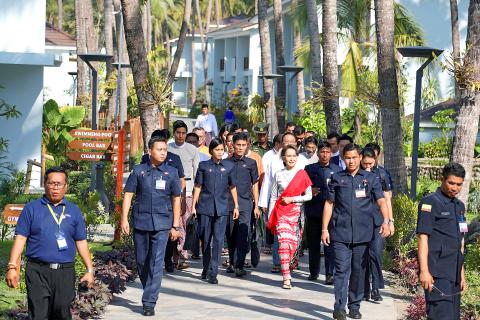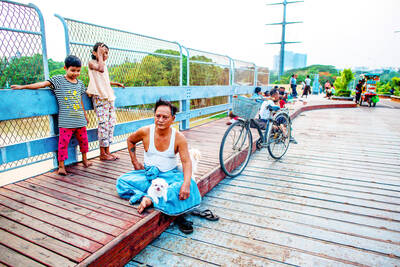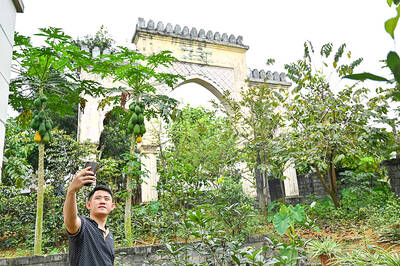Burmese State Counselor Aung San Suu Kyi yesterday touted Rakhine State’s “untapped” economic potential to investors, but glossed over violence that has scorched the area — most recently claiming the life of an 18-year-old civilian.
Rakhine, a vast stretch of arable land covering Myanmar’s western flank, with offshore oil and gas deposits and a long coastline, is also one of the country’s poorest states.
It has been scored by ethnic and religious conflict, especially in its restive northern region closest to Bangladesh. More than 740,000 Rohingya Muslims fled across the border after a bloody army crackdown in August 2017.

Photo: Reuters
The Myanmar Army is now also fighting rebels from the Rakhine ethnic minority, who are Buddhist.
However, in opening remarks to foreign companies at a Rakhine investment forum, Aung San Suu Kyi gave an upbeat characterization of the economic boon awaiting investors.
Much of the state’s potential “still remains untapped,” she said at the forum at Rakhine’s Ngapali beach, which is far south of the conflict area.
She trailed the promise of tourism, manufacturing and specifically the oil and gas sector as “one of the shining assets of Rakhine State.”
Participants from India, Japan, South Korea, Thailand and China were in attendance — the latter is building a massive port in the south of Rakhine and pipelines running through the strategically important state.
Aung San Suu Kyi blamed the international community for focusing “narrowly on negative aspects related to problems” in the northern part of the state, rather than the potential to uplift Rakhine through development.”
Rakhine is brimming with opportunities and “warm and friendly people, all eager to be part of the development adventure,” she said.
While Myanmar’s former junta stunted the Southeast Asian nation’s economy for decades, the advent in 2016 of a civilian government under Aung San Suu Kyi raised hopes of a turnaround in fortunes.
However, slow reforms, a weakening currency and conflict have stalled economic progress.
Aung San Suu Kyi’s image as an upholder of human rights has also been shattered by the Rohingya crisis, which the UN has called ethnic cleansing.
The treatment of the Rohingya has spooked Western investors and Myanmar has looked to its Asian neighbors to fill the gap.
As of last month, China, Singapore and Thailand led foreign investment in Myanmar, government statistics showed.
Aung San Suu Kyi’s positive comments were undercut by fresh fighting in Rakhine’s north between the military and the Arakan Army, an ethnic Rakhine force.
Villagers yesterday held a funeral for an 18-year-old Rakhine woman after she was killed in crossfire two days earlier as soldiers descended on their district in Rathedaung Township.
“She was cooking near the house of the village head,” a villager from Min Phoo village told reporters, requesting anonymity for safety reasons. “Our villagers did nothing wrong.”
Rakhine state police could not be immediately reached for comment.

As the sun sets on another scorching Yangon day, the hot and bothered descend on the Myanmar city’s parks, the coolest place to spend an evening during yet another power blackout. A wave of exceptionally hot weather has blasted Southeast Asia this week, sending the mercury to 45°C and prompting thousands of schools to suspend in-person classes. Even before the chaos and conflict unleashed by the military’s 2021 coup, Myanmar’s creaky and outdated electricity grid struggled to keep fans whirling and air conditioners humming during the hot season. Now, infrastructure attacks and dwindling offshore gas reserves mean those who cannot afford expensive diesel

Does Argentine President Javier Milei communicate with a ghost dog whose death he refuses to accept? Forced to respond to questions about his mental health, the president’s office has lashed out at “disrespectful” speculation. Twice this week, presidential spokesman Manuel Adorni was asked about Milei’s English Mastiff, Conan, said to have died seven years ago. Milei, 53, had Conan cloned, and today is believed to own four copies he refers to as “four-legged children.” Or is it five? In an interview with CNN this month, Milei referred to his five dogs, whose faces and names he had engraved on the presidential baton. Conan,

French singer Kendji Girac, who was seriously injured by a gunshot this week, wanted to “fake” his suicide to scare his partner who was threatening to leave him, prosecutors said on Thursday. The 27-year-old former winner of France’s version of The Voice was found wounded after police were called to a traveler camp in Biscarrosse on France’s southwestern coast. Girac told first responders he had accidentally shot himself while tinkering with a Colt .45 automatic pistol he had bought at a junk shop, a source said. On Thursday, regional prosecutor Olivier Janson said, citing the singer, that he wanted to “fake” his suicide

Le Tuan Binh keeps his Moroccan soldier father’s tombstone at his village home north of Hanoi, a treasured reminder of a man whose community in Vietnam has been largely forgotten. Mzid Ben Ali, or “Mohammed” as Binh calls him, was one of tens of thousands of North Africans who served in the French army as it battled to maintain its colonial rule of Indochina. He fought for France against the Viet Minh independence movement in the 1950s, before leaving the military — as either a defector or a captive — and making a life for himself in Vietnam. “It’s very emotional for me,”